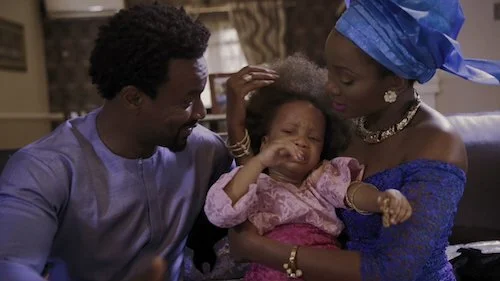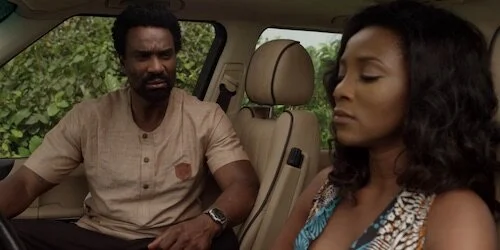The World of Movies: Road To Yesterday
Written by Rachael Crawley
The World of Movies is a series that explores global cinema, drawing on films from many countries, industries and eras. This week, we embark on a road trip across Nigeria.
May contain spoilers.
After last week’s emotional wringer of The Death of Mr. Lazarescu, it was definitely time for a nice love story. Fortunately, stumbling around Netflix brought me Road To Yesterday (Ishaya Bako, 2015), a story of a couple that is – every bit as sombre as last week’s movie. Great.
Victoria, who has been living in England with her daughter, arrives in Nigeria for a relative’s funeral. She and her husband, Izu, are estranged for unknown reasons. The movie takes us through their tense reunion, played out over a six-hour car trip. It is a quiet, moody journey, and it is the perfect way to bring all their problems to the surface.
One of the movie’s strengths is its quick establishment of atmosphere. Immediately, the viewer can tell that something is wrong, even before the characters really talk about it. The soft, slow score gives the film a lonely feeling. Oris Erhuero, as Izu, plays the role as a man who has been etched in pain, conveying the strain of his past every moment that he is in the frame. The road trip scenes feel very heavy, punctuated by petty arguments that stop just short of larger issues. Neither of the characters wants to be in this car, and neither wants to talk about why. This movie’s awkward silences often convey more than the dialogue does.
The story is told with flashbacks, which are marked with little to no transition from the main plot (though the scenes are usually thematically connected – e.g., a trip to a restaurant flashes back to a restaurant date). Rather abrupt, it can be confusing for the first few segments, until the viewer catches on. This structure works very well overall. The contrast between the young couple in love, and on the edge of divorce years later, is beautifully juxtaposed. It is successful in large part due to the work of Erhuero and Genevieve Nnaji, who have excellent chemistry, and seem perfectly natural in both eras of the relationship. They exude happiness as they first get to know each other, and are weighed down by anger and pain in the present. Without two nuanced, dynamic performances, this structure simply wouldn’t work, and these actors are well-suited to it.
Road To Yesterday.
Indeed, sometimes the “present” scenes can verge on too slow, and the road trip does have the occasional clunky dialogue. The sound mixing is a bit uneven, which sounds jarring when the couple is sitting right next to each other. However, the story and characters leave a strong impression, and these flaws are only small points in the larger context of the film.
The ending could be polarizing for viewers – without revealing the specifics, it does seemingly come out of nowhere, and leaves a lot of questions unaddressed. Personally, I liked it. The final scenes were cleverly constructed, weaving the finale back into the rest of the story, and Nnaji is excellent in these moments. Ultimately, I enjoy a movie that refuses to be resolved. There is no tidy ending here, for the viewers or for the characters.
Road to Yesterday is a compelling story, giving us a detailed look at the breakdown of a relationship. Where it succeeds most strongly is in its creation of Victoria and Izu, two characters who feel realistic throughout their time together. Over the long, quiet stretches of their doomed trip, the movie has ample time to provide insight into their joys and sorrows – and ultimately, leaves us wondering what could have been.
Rachael Crawley holds a Master's Degree in Film and Photography Preservation and Collections Management from Ryerson University, and has worked with film in Canada and in Europe. She adores language and cinema, and how these subjects interact with each other.




